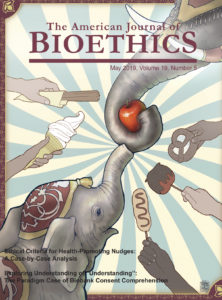This blog post made available by the American Journal of Bioethics. You can read this editorial and accompanying articles here.
by Laura Kelly, MS, Governor of Kansas
A single mother doing her best to raise her children. A small business owner realizing her dreams in a rural Kansas town. A caregiver for a disabled child. All these Kansans deserve the ability to see a doctor when they need one and receive the health care services necessary for them to remain productive members of their communities.
These Kansans are why my campaign prioritized Medicaid expansion and why it remains one of my highest priorities in office.
Right now, Kansas has among the most stringent eligibility requirements in the nation to qualify for Medicaid. Non-disabled adults without dependent children aren’t eligible at all. Parents must have income below 38 percent of the federal poverty level—$8,105 per year, or just $675 per month, for a family of three—to qualify. A single mother with two kids who works a minimum wage job just over half-time earns too much.
 These stringent eligibility requirements provide all the wrong incentives to Kansas families. If the mother I just described were offered a full-time minimum wage job—one that likely doesn’t come with health insurance—she would face an unacceptably difficult dilemma. Does she accept the job and lose her Medicaid, or turn down more work and a higher income to retain her coverage?
These stringent eligibility requirements provide all the wrong incentives to Kansas families. If the mother I just described were offered a full-time minimum wage job—one that likely doesn’t come with health insurance—she would face an unacceptably difficult dilemma. Does she accept the job and lose her Medicaid, or turn down more work and a higher income to retain her coverage?
It’s a choice no one should ever have to make.
That’s why I’ve asked the legislature to expand eligibility for Medicaid, known as KanCare in Kansas. Expansion would increase coverage to Kansans up to 138 percent of the federal poverty level, or $29,435 a year for the mother I just described. We can eliminate her hard choice and allow her the freedom to work to better support her family and retain her health coverage.
By expanding KanCare, we will eliminate a cruel coverage gap for nearly 150,000 Kansans who earn too much to be eligible for the current Medicaid program, but not enough to qualify for financial assistance to buy private insurance coverage. And we can join the 36 other states that have solved this problem by expanding Medicaid eligibility to those in the gap.
Why have so many other states implemented this policy? Of course, it’s the right thing to do. But it’s also a great deal for the state. Ninety percent of the funding comes from the federal government. Those are Kansans’ own tax dollars coming back home. Right now, Kansans’ taxes go to other states to pay for their coverage expansions. Of the remaining 10 percent, the state share of the cost, most would be covered by budget offsets and savings that become possible when health coverage is expanded.
Hundreds of millions of new federal dollars flowing into Kansas will have a profound effect on the state’s economy. Thousands of new jobs will be created. Economic growth and development will follow in health care and other industries, including real estate, retail, and construction, creating new revenue for the state and local communities. Kansas has already forfeited more than $3 billion in federal funding by failing to expand KanCare. We can’t afford to wait any longer to bring these dollars back home.
This issue is especially important for Kansas’s rural communities, which face a growing health care crisis. More than 8 in 10 rural Kansas hospitals operate each year at a loss, due in part to the fact that they treat many uninsured people who are unable to pay for their care. Many of these hospitals rely on community tax support to help keep their doors open. Nevertheless, four hospitals have closed in the past 3 years, three of them in the past few months. Others are in immediate danger. Community clinics, mental health centers, and other providers face similar threats.
When a hospital closes, more is lost than just ready access to health care services. In addition to being the anchors of the rural health system, hospitals are among the largest employers and key economic engines in their communities. Building and sustaining rural communities by attracting new residents and new businesses is already a challenge. It’s exponentially harder after the local hospital closes.
But most important, beyond the economic arguments and the plea to save rural hospitals, is the simple fact that Medicaid expansion would enhance access and make health care services available to hardworking Kansas families. A parent with a chronic illness should know that care is available for them when they need it so they can be available for their children. Kansas families should not be faced with financial ruin in the event that a parent gets sick or injured.
I am married to a physician and speak with doctors often. They tell me every day of the patients who go to them reluctantly, or sometimes not at all, because of the cost. They may have jobs in which insurance isn’t offered, or they cannot afford it. That usually means they are sicker and their conditions are more difficult to treat or manage when they do get to a doctor. If these patients need prescription medications or referrals to specialists, the challenge becomes even more difficult without insurance.
That isn’t the way to keep families stable. I ran for office to support Kansas families and expanding KanCare will help me keep that promise.
There are few investments in which a state puts up $1 and receives $9 in return, especially to implement a policy as ethical and valuable as this one. It’s time for Kansas legislators to join me in doing the right thing and expand Medicaid.